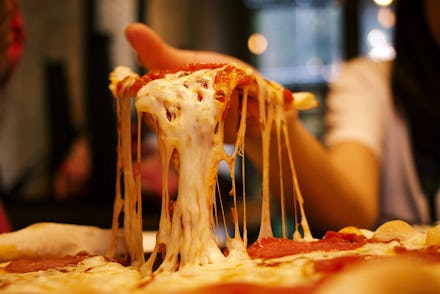Donating pizza to protests can fuel the resistance — this group wants to make it happen

What's one way to entice people to stick around and fight for human rights? Free food.
On Saturday night, Pizza to the Polls, an organization that fundraised and sent pizza to polling places with long lines during the 2016 election, received a number of tweets asking the group to send pizza to activists protesting President Donald Trump's executive order banning Muslim immigrants and refugees.
During the election, Pizza to the Polls gained a following because "it gave people stuck at home or at their jobs or in non-swing states a place to put their money and time," Scott Duncombe, a co-founder of Pizza to the Polls said in an email. Duncombe, an Oregon-based software engineer who has worked and volunteered with campaigns since Obama's 2008 campaign, started the organization the Sunday before the 2016 General Election and ended up sending 2,368 pizzas to polling places in 24 states.
Duncombe, his wife Katie Harlow and their friend Noah Manger started Pizza to the Polls after noticing "nothing brought people together and kept them in line like hot pizza," Duncombe said.
The success of the project led Twitter users to call on the democracy-loving pizza group during the protests on Saturday.
"Had to try and do something!" Duncombe said. He ordered 10 pies from a Queens, New York, pizzeria, tipped the deliveryman over 30% and managed to convince him to drop off the pies to anyone who'd take them at the protest at JFK Airport in New York City.
But sending pizza into the void that is a large-scale protest isn't as simple as delivering pies to an organized polling place.
On Election Day, people reported long lines at polling locations through the Pizza to the Polls site, and then Duncombe and the rest of the team would send pies to polling volunteers to distribute to hungry people waiting to cast their ballots.
In contrast, the JFK protest, which mobilized thousands of people, was spontaneous rather than organized. With large crowds of of people holding signs and chanting into megaphones and lawyers dashing through terminals hoping to connect with families in need, the protest was a nebulous force of passionate activists.
By the time Duncombe's order of 10 pies reached JFK, there was allegedly no one around. A manager from the local pizzeria called Duncombe at 9:42 p.m. to report that "people weren't really there anymore," Duncombe said. "I asked to see if he could drop them at a shelter or somewhere else where there'd be hungry people." A deliveryman texted Duncombe the next morning to say the pizzas had been taken to a homeless shelter in Queens.
Fueling democracy one slice at a time
Even though pizza is quick and easy to eat, Duncombe pointed out that a big, multi-pie order can take a long time to make. By the time an order is ready, protesters might be heading home after a small victory — like Saturday's ruling that people being detained who have legal documents for living in the United States could not be deported, which was at roughly 9 p.m. on Saturday night.
"It's hard to make sure the timing is going to be right and where to send the delivery people — a polling place is well marked and there'll always be volunteers there to handle the incoming food," Duncombe said. "With a protest, you just don't know — you could miss the window."
Then there's the problem of having someone on the ground to receive a pizza delivery. Ideally, Duncombe wants to have organizer contacts beforehand so Pizza to the Polls can direct the food to someone who's expecting it.
"It'd be great to point the firehouse of generosity that is the internet at people doing that hard work to make change." Scott Duncombe, Pizza to the Polls founder
Despite the obstacles, Duncombe said he'd like to use the Pizza to the Polls project to help some of the protests. "Pizza to the Polls was able to harness a ton of goodwill and energy on Election Day... it'd be great to point the fire hose of generosity that is the internet at people doing that hard work to make change."
Supporting people on the ground could take many forms. Duncombe said he's thought about raising money and then sending cash via Venmo to organizers on the ground.
"Sending $300 worth of pizza to a location where a march has just ended isn't that helpful. I'd like to keep experimenting [until] we get the model right, then see if we can scale in the same way we did on Election Day," he said, explaining he wants to hold off on fundraising until he's figured out the best possible system for fueling upcoming protests.
Why send hot slices to democracy-loving Americans in the first place? "Napoleon put it best: 'An army marches on its stomach,'" Duncombe said. "I want to do whatever I can to fill every stomach marching."